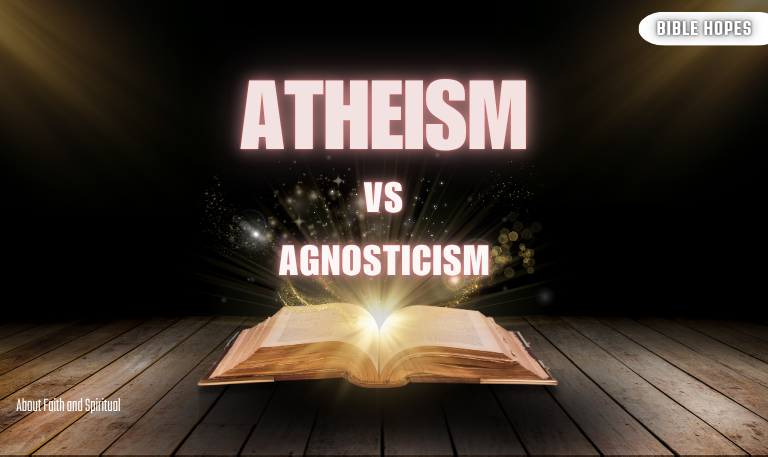In today’s world, where discussions around faith, belief, and spirituality are common, the terms atheism and agnosticism frequently come up—but often get confused or used interchangeably. While both relate to perspectives on the existence of God or gods, they represent distinct philosophical stances that affect personal identity, worldview, and social interactions.
Understanding the difference between atheism vs agnosticism helps clarify your own beliefs or better understand others’. It also enriches conversations on religion, philosophy, and science by providing a precise vocabulary. This article dives deeply into the origins, definitions, and nuances of both terms, offering a comprehensive, authoritative resource for curious readers and search engines alike.
What Is Atheism? — Definition and Core Beliefs
Atheism is the absence of belief in any gods or deities. It is often summarized as the position that there is no God. However, atheism is not a belief system or religion in itself; it is a stance on the question of God’s existence.
Types of Atheism
Strong (Positive) Atheism: The explicit belief that gods do not exist.
Weak (Negative) Atheism: The simple absence of belief in gods without a definitive claim that gods do not exist.
Atheists generally rely on empirical evidence and reason, often aligning with secular humanism and skepticism. Their worldview typically excludes supernatural explanations unless supported by strong evidence.
Read Also: Who Was Barak in the Bible
What Is Agnosticism? — Definition and Core Beliefs
Agnosticism comes from the Greek agnostos, meaning “unknown, unknowable.” An agnostic holds that the existence or non-existence of God or gods is unknown or perhaps inherently unknowable.
Types of Agnosticism
Strong Agnosticism: The belief that it is impossible to know whether any gods exist.
Weak Agnosticism: The position that one currently does not know but remains open to evidence.
Agnostics often emphasize intellectual humility, arguing that certainty about such metaphysical questions is beyond human reach. Agnosticism addresses knowledge rather than belief, which sets it apart from atheism.
The Core Difference Between Atheism and Agnosticism
| Aspect | Atheism | Agnosticism |
|---|---|---|
| Focus | Belief (or lack thereof) in God(s) | Knowledge or certainty about God(s) |
| Stance | Does not believe God exists | Believes it is unknown or unknowable |
| Claim | God does not exist (strong) or no belief (weak) | God’s existence is unknowable or unknown |
| Nature | Position on belief | Position on knowledge |
Historical Origins and Evolution
Atheism: Traces back to ancient Greece and India; figures like Epicurus and Democritus expressed early atheistic ideas. In the Enlightenment, atheism became associated with scientific skepticism.
Agnosticism: Term coined by Thomas Henry Huxley in 1869 to describe his philosophical skepticism about the limits of human knowledge regarding the divine.
How Do Atheists and Agnostics View Religion?
Atheist Perspective on Religion
Often critical of religious dogma due to lack of empirical evidence.
May view religion as a social or psychological phenomenon rather than divine truth.
Agnostic Perspective on Religion
May be indifferent or open to religious beliefs but skeptical of claims of absolute truth.
Some agnostics practice religion culturally without strong conviction.
Can Someone Be Both Atheist and Agnostic?
Yes. The categories address different questions—belief vs knowledge—so they are not mutually exclusive.
Agnostic Atheist: Does not believe in any gods but does not claim to know for certain that gods do not exist.
Agnostic Theist: Believes in God but admits that this belief is not based on certain knowledge.
Common Misconceptions Clarified
Atheism is not a religion: It lacks rituals, doctrines, and worship.
Agnosticism is not indecision or fence-sitting: It is a reasoned position about knowledge limits.
All atheists are not certain there is no God: Many simply lack belief due to insufficient evidence.
Why Do People Identify as Atheist or Agnostic?
Personal experiences, upbringing, education, and exposure to science shape beliefs.
Psychological factors like need for certainty vs comfort with ambiguity.
Social and cultural influences.
The Role of Science and Evidence
Both atheism and agnosticism often appeal to science, but:
Atheists tend to emphasize the scientific method and empirical proof to reject God’s existence.
Agnostics emphasize the limits of science to make metaphysical claims beyond natural phenomena.
How Do Morality and Ethics Fit Into These Views?
Many atheists and agnostics reject the idea that morality depends on religion.
Secular ethics, humanism, and social contracts provide frameworks for morality without divine command.
Famous Figures: Atheists and Agnostics Through History
Famous Atheists: Richard Dawkins, Christopher Hitchens, Friedrich Nietzsche
Famous Agnostics: Thomas Huxley, Charles Darwin, Mark Twain
Read Also: What Is The True Religion
Comparative Table: Atheism Vs Agnosticism
| Factor | Atheism | Agnosticism |
|---|---|---|
| Belief in God | No | Open/Unknown |
| Claim about Knowledge | No claim or claims no God exists | Claims knowledge is unavailable |
| Approach to Religion | Often critical or rejecting | Often neutral or skeptical |
| Relation to Science | Emphasizes empirical evidence | Emphasizes limits of knowledge |
| Emotional or Cultural | Varies widely | Often intellectually humble |
Atheism Vs Agnosticism FAQs
Q: Is agnosticism the same as atheism?
A: No. Atheism is about belief; agnosticism is about knowledge. Someone can be both.
Q: Can agnostics believe in God?
A: Yes, agnostics may lean toward theism or atheism but claim uncertainty or unknowability.
Q: Are atheists always certain there is no God?
A: Not necessarily. Many atheists simply lack belief without claiming absolute certainty.
Q: What are the main arguments for atheism?
A: Lack of empirical evidence, problem of evil, and inconsistencies in religious texts.
Q: What are the main arguments for agnosticism?
A: Limits of human knowledge, lack of definitive proof, and the idea that God’s existence is unknowable.
Q: How do atheism and agnosticism differ from theism?
A: Theism affirms belief in God(s), atheism denies it, and agnosticism suspends judgment on knowledge.
Q: Is agnosticism a middle ground between theism and atheism?
A: Yes, in terms of knowledge, but it doesn’t imply belief.
Q: Can agnosticism be considered a religion?
A: No, it is a philosophical stance, not a religion.
Q: How do atheists and agnostics find meaning in life?
A: Through personal values, relationships, science, philosophy, and humanism.
Q: How do theists view atheism and agnosticism?
A: Varies widely, from acceptance to opposition.
Conclusion
Grasping the differences between atheism and agnosticism enriches our understanding of belief, knowledge, and skepticism. While atheism centers on the presence or absence of belief in gods, agnosticism explores the limits of what humans can know. These positions are not always mutually exclusive and provide valuable perspectives in contemporary religious and philosophical discourse.



![15 Pink Bible Verses | Discover Meaning, Love [2025 Guide] 5 15-Pink-Bible-Verses-Discover-Meaning,-Love-[2025-Guide]](https://biblehopes.com/wp-content/uploads/2025/05/15-Pink-Bible-Verses-Discover-Meaning-Love-2025-Guide.png)